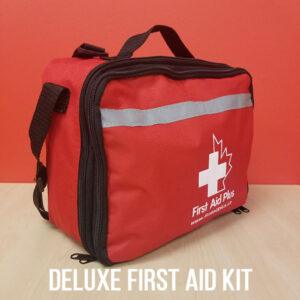Although nosebleeds can be alarming, there are effective ways on how to stop a nosebleed at home. Getting a nosebleed is expected, so you are not alone if they happen to you. Nosebleeds are even more common for those who live in certain climates that dry the nose. From hot and dry climates outside to cold temperatures that keep inside during the winter with the heat on, both will dry out your nasal cavity. Both environments are the enemy to your nose when it comes to nosebleeds.
Unfortunately, if you live in a mild climate, you may not be able to escape an accidental injury. People with seasonal allergies and children who can't seem to keep their fingers out of their noses live in various climate types. Regardless of where you live, we are all susceptible.
With that said, let's dive right in with the most common causes of a nosebleed, how to stop a nosebleed and the preventative measures you can take to keep your nose happy and less susceptible to a future nosebleed.
Common Causes of a Nosebleed
- Picking your nose
- Allergies
- Medication Side Effects (e.g., acne medication or blood thinners)
- Injury (during a fall or nose gets hit)
- Blowing nose too hard or too often
- High altitudes
The good news is that nosebleeds are usually treatable at home and are not severe. Take the following steps.
Important Note: If you cannot stop a bleeding nose after taking the steps below and the bleeding persists, call for medical help.
How to Stop a Nosebleed
- Stay Calm, Do Not Worry: Stress can cause more bleeding. Try to stay calm.
- Keep your Head Above Your Heart: Stay seated up. Do Not lay down.
- Tilt your Head Slightly Forward: This will prevent any blood from draining down the back of your throat.
- Hold Nostrils Closed: This will put pressure on the part of your nose that is bleeding and will stop the blood from flowing. Breathe through your mouth while using your thumb and index finger to pinch your nostrils closed. Check after 5min; if the bleeding persists, repeat for another 5min.
After the bleeding has stopped, refrain from touching or blowing your nose because this can trigger another nosebleed.
If the bleeding restarts?  Gently blow your nose to get rid of any blood clots, or use a nasal decongestant in both nostrils and repeat the same procedure as above. Suppose you need to see a doctor because of an injury to your nose. In that case, if you get nosebleeds often, or if 20min has passed and your nose is still bleeding, your doctor will usually try to stop the bleeding with pressure first. If this is not successful, your doctor may try the following.
Gently blow your nose to get rid of any blood clots, or use a nasal decongestant in both nostrils and repeat the same procedure as above. Suppose you need to see a doctor because of an injury to your nose. In that case, if you get nosebleeds often, or if 20min has passed and your nose is still bleeding, your doctor will usually try to stop the bleeding with pressure first. If this is not successful, your doctor may try the following.
Cauterization: This procedure burns a blood vessel closed. After your doctor numbs your nose, they’ll use either a heated electronic device (electrocautery) or a chemical called silver nitrate to seal the leaky blood vessel.
Packing: Your doctor puts a latex balloon or gauze into your nostril and applies pressure to the blood vessel until it closes and the bleeding stops.
How to Prevent a Nosebleed
Nosebleeds are unavoidable but, there are some habits that you can adapt to lower your chances of a nosebleed or decrease their severity when they do occur.
Use A Humidifier: This will increase the humidity in your bedroom while you sleep and will keep your nostrils moist.
Never Smoke: Among all the reasons not to smoke, smoking can irritate and dry out your nostrils.
Refrain From Picking Your Nose: Mom was right! Keep your finger out of there. If you are trying to break your child's habit, keep their fingernails short and encourage them to stop.
Use Saline Nasal Products: This goes hand in hand with keeping your nostrils moist.
Petroleum Jelly to the Rescue: If you live in a dry climate or have dry nostrils all the time, use a cotton swab and apply petroleum jelly 3 times per day. Be sure the 3rd application is right before you go to sleep.
Minimal Use of Cold and Allergy Medications: Some medications can cause nosebleeds or cause them to be more severe because of their drying effect. Talk to your doctor and refrain from stopping any medication until you discuss it with them.
For more in-depth knowledge on how to stop bleeding in severe cuts, check out our Stop the Bleed course, or find all the first aid supplies you could need in our online First Aid shop.
Stay Safe Everyone
The First Aid Plus Team

